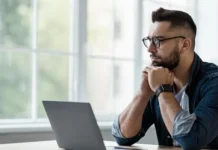I became a Doctor because of a desire to help, and here’s my story. When the pandemic hit in my hospital that I love and have worked at for 10 years, the desire to help consumed me. I offered to would work in any capacity that could benefit the patients and staff. After hearing that the nationwide lock down kept family away from patients, my colleague, Dr. Marc Schiffman, and I, volunteered to serve as doctor-patient liaisons in the ICU, and provide families with medical updates. We rounded with ICU staff and began to call families. During these phone calls, families overwhelmingly requested to speak to their hospitalized loved ones.
The current methods in place for communication such as iPads and iPhones, required an intermediary to hold the device, used PPE, exposed staff the virus and used one of most precious commodities during COVID – clinical staff’s time.
We knew there had to be a better way to allow an automatic hands-free communication with family anywhere in the world at any time. We found a walkie-talkie device that connected to a cell phone app at a nearby department store. After approval with hospital IT, we started testing the speaker in the ICU. Within the first days of the pilot, we noticed the speaker holes could be subject to contamination, staff expressed concern that the talk button could be accidentally pushed, and the magnetic charger could be detached which required additional staff maintenance. I was determined to make something work for the family – just as why I became a doctor.
However, the family’s overwhelmingly positive feedback regarding the ability to communicate to loved ones, motivated us to brainstorm solutions to these concerns. We sketched out a litany of ideas and designed recyclable medical-grade case that could be replaced when soiled, held the charger in place, Velcroed to a patient’s bed, could be labeled with patient information and travel with patient as they were transported throughout the hospital.
With the implementation of the case, the technology seamlessly transitioned into our ICUs. Within days, requests for devices multiplied, and the applications of the device grew as well. We had requests from palliative care, neurology floors and from non-COVID patients whose family was far away. The benefits to family were immediate, but as patients recovered, they gave reports of hearing their family voices, implying that there may even be health benefit to the patient. Such a joy to hear! That’s why I became a doctor.
The VoiceLove device became so powerful it turned into a movement known as the VoiceLove Project that integrated Social Work into the deployment of devices. Finally, a symphony of laughter, song, prayer, and cries from family overshined the monotonous ICU beeps.
We hope to continue to spread VoiceLove throughout the world and make communication between patients and loved-ones a universal right in healthcare.
I am humbled that these special families going through such pain let Marc and I into their lives and taught me a critical life lesson that I will forever use to help others; never underestimate the healing power of voice. That’s why I became a doctor.















